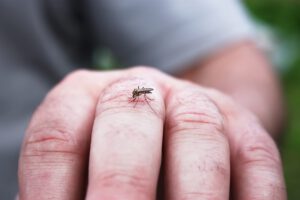Editor’s note (9/12/2024): We updated this post with new estimates by the World Health Organization on the number of deaths due to malaria.
Just in time for summer, a first of its kind study showing genetic associations between not just how much more attractive some of us are to mosquitoes but the severity of the reaction to their bites.

The study conducted by scientists at Pfizer Inc. and 23andMe and published in the journal Human Molecular Genetics, found 15 genetic variants associated with the size of welts left behind from mosquito bites, the intensity of itch, as well as how attractive some of us are to the insects.
Almost all of the variants identified are in or near genes related to immune response. Many of the variants were found in or near immunity-related genes involved in cytokine signaling. Cytokines are the small proteins like interferons and interleukins that are important for signaling an immune response from other cells. In addition, the data points toward genetic regions involved in stimulated T-cells, which also play a central role in immune response.
The study, conducted by scientists at Pfizer Inc. and 23andMe, included anonymous, de-identified data from more than 69,000 23andMe customers who consented to participate in research. Researchers focused on the genetic variants that overlap all three “mosquito bite traits.” The research for this paper could also help in “developing novel methods for attracting and repelling mosquito populations,” according to the authors
“Our findings further explain the complex interaction between humans and mosquitoes,” the researchers said.
Mosquito-Borne Illnesses
Mosquito bites are just a nuisance for many people, but for others, they can lead to more severe reactions, including blistering hives, joint swelling, and, in rare cases, anaphylaxis. In addition, mosquitoes are one of the deadliest creatures on earth, contributing to hundreds of millions of deaths every year due to transmission of diseases such as Dengue fever, West Nile Virus, Zika, and malaria. In 2022, malaria accounted for more than 608,000 deaths, according to the World Health Organization. Understanding how people respond to bites and why some of us are more susceptible to getting bit could help stop the spread of these grave insect-borne diseases.
When a mosquito bites, it pokes through the skin of its victim and releases a substance to prevent clotting, making it easier to feed on the blood. That substance, in turn, triggers an immune response in people as their bodies release histamine to fight the foreign substance. In some individuals, the response is immediate and quite intense. The size of the welt, or “wheel,” that’s left behind and the severity of the itch varies in part based on a person’s genetics.
Twin Studies
While genetics is not the only factor in why these mosquito bite traits differ, it is an important factor. Indeed, the researchers in this study recognized that they’ve identified only a small percentage of all the genetic factors involved, according to the paper. However, this isn’t the first time scientists have found genetic associations for at least one of the traits included in this study. 23andMe first looked at the genetics around response to mosquito bites about four years ago, looking specifically at the severity of the reaction to bites. In addition, a twins study conducted two years ago by researchers at the King’s College School of Public Health found a strong genetic component that caused some people to be more attractive to mosquitoes than others. More recent work found that individuals infected with malaria may make them more attractive to certain species of mosquitoes.
Genetic Studies
23andMe has done internal research looking at the genetic associations at how severely people react to mosquito bites.
The study published in the journal of Human Molecular Genetics looked at all these mosquito bite traits together, and the researchers found overlapping genetic associations. Among the findings, the analysis in this study suggested that genetics play a slightly stronger role in how attractive a person is to mosquitoes. In addition, the attractiveness to mosquitoes shares more overlapping genetics with bite-size and itchiness than bite size and itch intensity share. Researchers also found that women were more likely to report getting larger welts and itchier bites. Women also had a greater perceived attractiveness to mosquitoes.
Why is this research important?
Ultimately, scientists hope that by understanding the genetic basis for why some people are more attractive to mosquitoes and have stronger reactions to their bites, they could offer new insights into ways to repel the insects. Some of those methods may include treatment that would enhance the body’s natural ability to repel mosquitoes.
* Pfizer Inc. funded this study in its entirety, working with 23andMe. Study authors are current or past employees of and own stock or stock options in either Pfizer Inc. or 23andMe.




